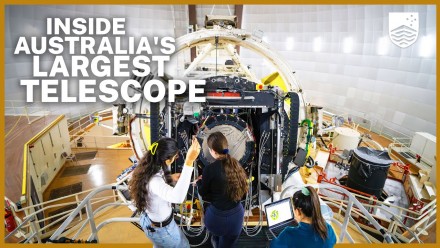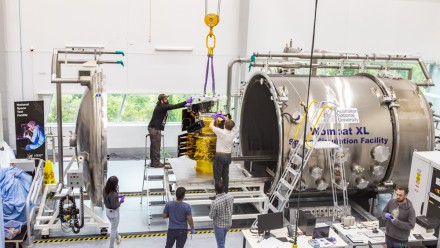Information for International Students
Welcome to the Research School of Astronomy and Astrophysics
The Research School of Astronomy and Astrophysics (RSAA) is part of The Australian National University. The Australian National University is one of Australia's premier universities. Some of our astronomers have won the Nobel Prize, the Prime Minister's Science Prize, and are Laureate, Federation, Future and DECRA Fellows of the Australian Research Council. We also have members of the Academies of Science in Australia, the USA, the UK, the Netherlands, and Spain. Our graduating students regularly achieve prestigious international fellowships including Fulbright, Zonta, Hubble, CfA, Carnegie, ESO, Magellan, CITA, Oort, and Jansky Fellowships.
Our mission is to:
- Train outstanding young scientists to lead ground-breaking research projects in astronomy, astrophysics, and instrumentation.
- Advance the observational and theoretical frontiers of astronomy and astrophysics, and their enabling technologies.
- Provide national and international scientific leadership.
PhD research projects on offer are at the cutting-edge of astrophysics and instrumentation science, and include observations with the Hubble Space Telescope, the Gemini and Magellan 8m class telescopes, the Keck 10m telescope, and new theoretical simulations with ANU and national supercomputer facilities.
Location: Nature and Culture
The Australian National University is located in Canberra, the capital city of Australia. Canberra is one of the few capital cities where nature reserves and parkland are integral to the city plan. Canberra has extensive walking and bike trails. The Research School for Astronomy & Astrophysics is located at Mount Stromlo, within the Stromlo Forest Park. The Stromlo Forest Park includes a world-class mountain-biking trail, the Robert de Castella cross-country running track, the Stephen Hodge Criterium cycling circuit, and extensive equestrian and hiking trails.
Canberra hosts the National Art Gallery, the National Portrait Gallery, the National Museum of Australia, the National Library of Australia, and the National Film and Sound Archive. Canberra also has a vibrant and dynamic music scene. Numerous music events are held year-round by ANU School of Music, the Canberra Symphony Orchestra, local choirs & bands, the annual National Folk Festival, the Floriade, the annual Canberra International Music Festival, touring Australian and international acts, rock festivals, live jazz, bands and DJs.
Our international PhD program
The Research School of Astronomy & Astrophysics (RSAA) at the Australian National University invites applications from outstanding undergraduate and postgraduate students of all nationalities for fully-funded PhD scholarships. Students with previous research experience in astrophysics or related fields (including undergraduate research projects and/or a research-based Masters degree) are particularly encouraged to apply.
Course foundation
The RSAA PhD Program offers the option to undertake innovative astrophysics courses taught by some of the world's pre-eminent astrophysicists. These courses aim to provide students with a broad and deep understanding of the major fields in astrophysics, including cosmology, galaxy formation & evolution, stellar evolution & atmospheres, planetary science, high-energy astrophysics, and the physics of the interstellar medium. We also offer courses in astrophysical computer programming, observational techniques, and data analysis, and scientific writing.
Early research opportunity
You will commence work on finding a PhD research topic right from the start, by undertaking literature reviews, exploring work groups and meeting with potential supervisors. This will help you to choose a research topic that matches your research interests and that matches your research strengths and skills. Since completing a PhD at RSAA typically takes 3-4 years, you will be able to enter the international job market at a younger age than in many other countries.
International scholarships
Successful PhD scholarship applicants are fully supported with a tax-free scholarship plus an RSAA top-up scholarship, and tuition-fee waiver. PhD students may also access internal research funds and fellowships to cover travel and other research expenses, including international conferences and telescope observing.
Strong international support
Our research staff comes from many countries across the globe. More than half of our PhD students are international students from all over the world and the student cohort is approximately 50/50 male/female. Our international students receive the same research opportunities and scholarship support as local students. A relocation allowance is part of the ANU PhD scholarship as well as part of the Australian Government Research Training Program (AGRTP) Scholarship. ANU offers our students a friendly and collaborative research environment. In addition, ANU offers many support services to students, including a Research Training Program team and Academic Skills team that offer academic workshops for PhD students throughout the year.
Alumni and success rate
The RSAA has a long history of successful PhDs. We have a selective PhD program, and our PhD success rate is extremely high. This means that if we accept you into PhD program at RSAA we have the expectation that you will complete your PhD in a reasonable time and move successfully to the next stage of a career in astronomy or in a related field. Our PhD students regularly receive prestigious international scholarships and fellowships, and our alumni are now employed in astronomy all over the world, including ANU, Arecibo, Cambridge, Caltech, Columbia, the European Southern Observatory, Harvard, Kapteyn Astronomical Institute, Leiden University, Max Planck Institut fur Astrophysics, MIT, Princeton, the Space Telescope Science Institute, the University of California, University of Amsterdam, Yale, and Yonsei University Observatory, to mention just a few.
Our facilities
RSAA has a long history of technical research and development, and is equipped with specialised engineering facilities for astronomical instrumentation. These facilities include a mechanical engineering design office and sophisticated mechanical workshops, an electronic design and manufacturing group, optics design and associated laboratories, and a software group that develops and implements control systems for telescopes, instruments, and data processing. This tradition of expertise and development of advanced instrumentation has culminated in the Advanced Instrumentation Technology Centre (AITC), a world-class facility for developing and testing astronomical instrumentation, small satellites, and space payloads.
RSAA also has access to powerful supercomputing facilities, including ANU-based and national high-performance computing facilities.
Our faculty
Our faculty and research staff consists of over 50 astronomers with diverse, world-leading reasearch programs. Research projects and supervisors are available in several different areas of research and instrumentation. Please refer to our researchers and projects pages to get an idea of the breadth of research conducted at RSAA and to get in touch with potential PhD supervisors.
How to apply
The Research School for Astronomy & Astrophysics (RSAA) at the Australian National University invites applications from outstanding undergraduate and Master's students of all nationalities for a number of fully-funded PhD scholarships. Students with previous research experience in astrophysics are particularly encouraged to apply.
Applications are currently closed -- applicants in the current round will be contacted in February 2024. The new application round will open towards September/October 2024, with an application deadline in November 2024 -- Details TBD.
Admission requirements
We are seeking outstanding students from around the world. Students should normally have a strong background in physics, including classical mechanics, statistical mechanics, electromagnetism, optics, thermodynamics, special relativity, quantum mechanics, and nuclear physics. Courses in mathematics are also required, including differential equations and vector calculus. An undergraduate course in introductory astronomy is recommended. Students with previous research experience in astrophysics (as an undergraduate or as a Masters student) are strongly encouraged to apply.
An ANU-based equaivalent grade-point average of >80% and a significant research component in your prior undergraduate/Masters (usually an undergruate or Master thesis) is a minimum requirement for consideration in the RSAA PhD program. In selecting scholarship candidates, we consider academic achievement, letters of recommendation, and independent research ability and experience.
Submitting your pre-application
To be considered for our international program, please email the following documents as a single combined pdf file in the following order to rsaa.international@anu.edu.au by the pre-application deadline:
- Curriculum Vitae (CV)
- Personal Statement
In a maximum of 2 pages, describe your experience, your research interests, your goals, your achievements, your initiatives/plans for improving research/work culture and diversity, and any other information that you think is relevant to your application.
- Copies of academic transcripts
If not already in English, then you need to provide your academic transcripts translated to English.
-
Copies of any undergraduate/Master's thesis and/or peer-reviewed, published (or accepted) research paper(s), if already available. Ultimately, admission into the ANU PhD program requires you to have had a significant resarch component in your undergraduate/Master studies (pure coursework would not fulfil the basic admission requirements); see more details about the Doctor of Philosophy, Astronomy and Astrophysics.
You must also arrange to have 3 Letters of Reference arrive at rsaa.international@anu.edu.au no later than 1 week after the application deadline. Your undergraduate/Masters research/thesis advisor should normally be amongst your letter writers. Letters addressing your research potential are generally more helpful than letters that describe your performance in coursework alone. Please ask your letter writers to prepare their Letters of Reference using the Referee Report Form (see also Documents section).
Complete pre-applications received by the deadline will receive full consideration. Applicants are encouraged to contact RSAA faculty about potential research projects in the applicant's areas of interest prior to the application deadline. Also note that successful pre-applicants will be required to satisfy ANU english language requirements. It is not necessary to satisfy these requirements prior to the pre-application deadline.
ANU values diversity and inclusion and is committed to providing equal opportunities to those of all backgrounds, identities, and protected attributes. We welcome and encourage applications from minorities and underrepresented groups, affirming our commitment to fostering a richly diverse and equitable community.
If you have any questions regarding the RSAA or our PhD program, please do not hesitate to contact us at rsaa.sa@anu.edu.au.











